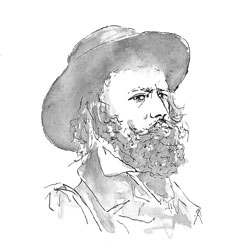Reading ‘Tears, idle tears’ (3): Heather Glen on Putting Tennyson in Context
Tears, idle tears, I know not what they mean,
Tears from the depth of some divine despair
Rise in the heart, and gather to the eyes,
In looking on the happy Autumn-fields,
And thinking of the days that are no more.Fresh as the first beam glittering on a sail,
That brings our friends up from the underworld,
Sad as the last which reddens over one
That sinks with all we love below the verge;
So sad, so fresh, the days that are no more.Ah, sad and strange as in dark summer dawns
The earliest pipe of half-awaken'd birds
To dying ears, when unto dying eyes
The casement slowly grows a glimmering square;
So sad, so strange, the days that are no more.Dear as remember'd kisses after death,
And sweet as those by hopeless fancy feign'd
On lips that are for others; deep as love,
Deep as first love, and wild with all regret;
O Death in Life, the days that are no more.
'What might it mean' - Professor Heather Glen questions in a Literary Criticism lecture she currently gives to Cambridge undergraduates - 'to think about Tennyson's poem as historically different' from other 'romantic lyrics'?. In many ways 'Tears, idle tears' can be interestingly compared to later 'romantic lyrics', like : both of these 'romantic lyrics' might be seen as 'expressions', says Glen, 'of a solitary speaker providing a revelatory account of the self'. But what is distinctive about Tennyson's lyric?
Professor Glen argues that the 'I' of the poem, its speaking voice, is much less particularized, or individualized, than the 'I' in many other lyrics. Whereas Leavis saw a lack of particularity as a defect in the poem, she does not. She goes on to highlight how Tennyson's 'images' are 'not those of specific unique autobiographical memory'; Tennyson uses more generalized literary images than lyricists like Lawrence for example, such that - again - there is less focus on the individual character of the speaker than we might expect in other poetry. In this respect she differs from Brooks, who gave much more attention to the character of the 'Weeper'.
Supporting her claim about the 'literary' nature of Tennyson's imagery by illustrating how its 'happy autumn-fields' seem intentionally to echo the imagery of , Professor Glen goes on to suggest that 'Tears, idle tears' seems less concerned 'with individual feeling [or individual images] than with feelings [and images] that are shared by all'. What do you think about this? 'Customarily', she continues, 'the movement from the personal to the impersonal involves an implicit claiming of authority', a transition from claims like 'this is what I feel' to claims like 'this is true'. Do you think that, by moving away from particularity and towards general feelings and communal imagery, Tennyson intends his narrator to appear more authoritative?
If Tennyson does adopt a voice of 'authority' in 'Tears, idle tears', Professor Glen suggests that we might connect this with some biographical facts about Tennyson, such as that he had already been established as a public poet by 1847; that he was by this time, already in receipt of a ; and that just three years later he would become the Poet Laureate. By incorporating extra-textual information of this kind within our interpretation, we begin to depart from the strict ethos of New Criticism. Think about whether or not you are happy with this departure: do you think it is better to focus on poems in isolation or do you think it is useful to introduce these kinds of biographical detail into our analysis of what a poem means?
Whereas we might thus want to say that the speaker in Tennyson's poem appears de-personalized because the public poet is consciously adopting a super-human voice of cultural authority, Professor Glen suggests how we might alternatively counter this idea by observing that the voice of 'Tears, idle tears' is not actually confident. Indeed, the 'we' of the second stanza, Professor Glen continues, 'is hardly that of assured and urbane control; it is more like one of shared pain'. Tennyson is referring to how everything 'we' love 'sinks... below the verge'. Obviously this is a general statement about something that happens to all of us, and in that limited sense it is bold, but does it sound authoritative?
Having echoed Leavis in highlighting how 'the first person fades out of this poem', Professor Glen echoes Brooks when she talks about the power of this poem's imagery. However, 'the images whose sharpness Cleanth Brooks admired' she claims, 'are, at least in the first three stanzas, images of that over which human beings have no control': for example Tennyson highlights the seasons in stanza 1 and then 'the implicit rage of the rising and setting sun' throughout stanza 2, before expanding this image into the dark summer dawns of stanza 3. If mortality is therefore a central focus of the poem, Professor Glen wonders whether Tennyson's apparent adoption of authority is in fact (or is at least countered by) an admission of common human frailty. What do you think? Is Tennyson's speaker fragile or strong?
Professor Glen links both this poem's lack of rhyme scheme (unusually for a lyric of this sort, none of the lines rhyme) and its 'binding, relenting, tolling repetition' to the idea that Tennyson may have consciously intended to offer no sense of resolution or relief in 'Tears, idle tears'. As we read it, we encounter 'repetition rather than formal completion'. Perhaps this idea of incompletion relates to and enhances the sense of human weakness which Professor Glen believes is expressed in the poem. Can you see how this might be so?
Click here to continue to the next part of this close reading of Tennyson's 'Tears, idle tears'.
